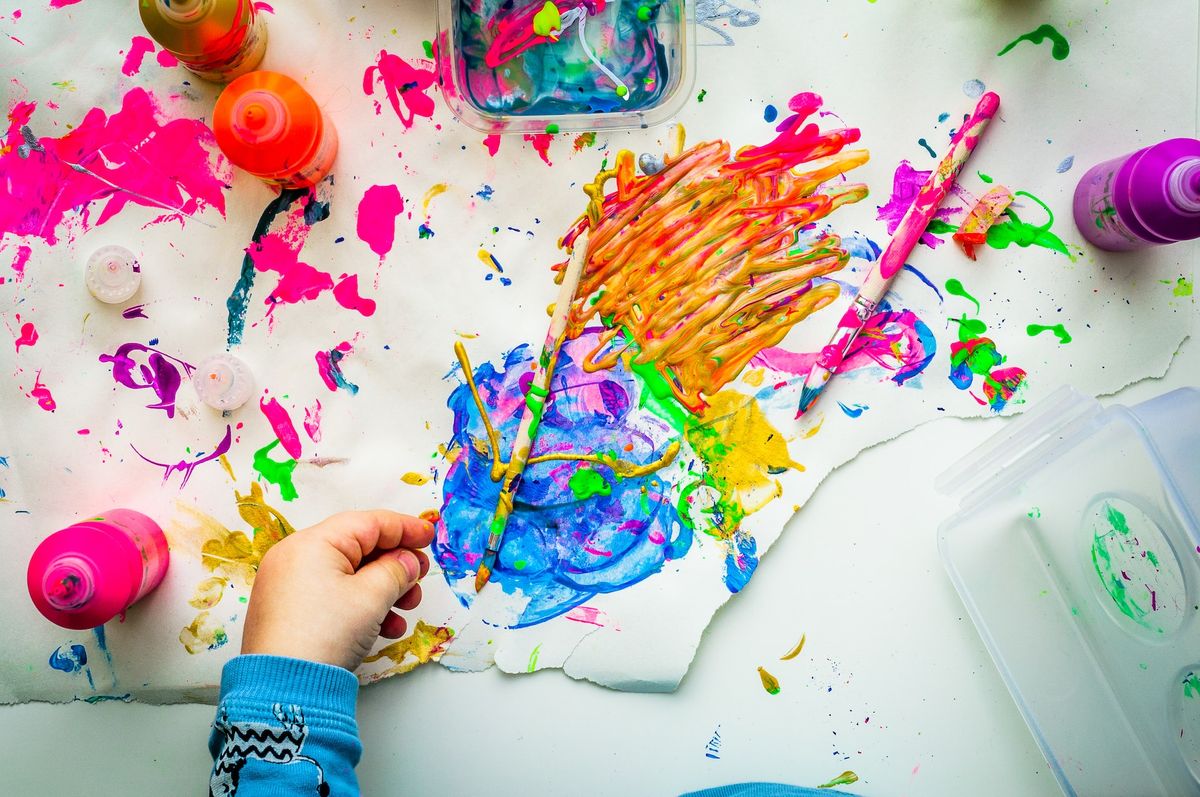knowing what you know, would you still create?
Reframing the creative journey and its inherent challenges in a way that serves and empowers us

I've been feeling quite like an imposter off late in almost every aspect of my life, but especially when it comes to sermonizing on the creative life.
Of course, we are all works in progress, we always will be, and we'll never have everything figured out. There is no final destination to cross in this journey of life, unless you consider death, and we're all inexorably heading there anyway, whether we wish it or not.
Yet, this past week I once again succumbed to demanding that the Universe provide me immediate material returns for my writings — a cheque in my hands, some moolah in the bank, a 5-star review somewhere, several books sold.
And when none of that was fulfilled, I went about feeling grumpy and whiny, unable to exert patience when overwhelmed either by the prospect of cleaning up our home before a playdate or helping little D with something.
And so I went and did the thing that gave me a lot of joy and a lot of escape. I continued and finished watching Season 1 of The Vampire Diaries and am well into Season 2 now, just to get my fill of its very good-looking cast and be enamoured by the possibility that in some alternate version of the Universe there exists a high school whose students are required to be pre-occupied more with festivals and carnivals, love and heartbreak, secrets and adventures, than with more mundane things like studying and thinking of earning money in the real world.
Myths about what a creative life looks like
So why does all this make me feel like an imposter? Because this is not what a true creative does, innit?
We're not supposed to create for the sake of external validation but for our own growth and conscious expression and evolution.
We're not supposed to moan about how hard it is to create because we're lucky enough to work on our passion projects and try to make a living out of it whereas everybody else is slowly dying inside, from one Monday to the next, in their soul-crushing 9-to-5 jobs.
Every moment not spent creating or imbibing inspiration is a waste of our precious time. Every moment spent complaining about how things are not going our way is a display of ungrateful wretchedness.
Creating is supposed to be fun and frolic. We're supposed to face challenges head on, because aren't we trying to dispel the myth of the starving artist in these modern times full of opportunities and resources? Heck, we're in the thick of the gig economy, aren't we?
That's a lot of pressure on any human being, let alone someone who tries to make a living from their art in which they are required to do the work first and are not guaranteed a pay.
Instead of accepting these thoughts as fact, which Older Me would have impulsively done, I've begun to question these opinions as they arise in an attempt to dissect them and get to the heart of the matter.
To me, it appears that over the past couple of decades, or perhaps even more, this has become a world that leads you to believe that 'Anybody can do anything as long as they work hard and persevere.'
Over time, we've let go of the appendage and stuck to the 'Anybody can do anything' motto.
While highly motivating, this statement can be turned on its head to suggest that if someone can't do something, then they are to blame for it.
The implication is that they must have done something wrong along the way — not worked hard enough, not been smart enough to grab the opportunities that came their way, not persevered enough to show up at the right places at the right time.
How do we know? How do we know which is the right place? How do we know how much longer we ought to persevere before we receive a windfall?
On the unforgiving disconnect between effort and reward
I remember reading a story as a very young child on the topic of perseverance.
Once a king went hunting in the forest but, as is wont to happen in stories like these, he somehow strayed away from his soldiers, met with an accident and fell from his horse into a very thorny bush. He lost consciousness and was covered all over in thorns.
The local villagers found him and rescued him. Not knowing exactly who he was, they brought him to one of their homes, where one young damsel put in the painstaking effort of removing each thorn, one by one, from his body.
Sometime during this process, the king regained consciousness but thorns still covered his eyes, so he kept them closed and silently vowed to himself that he'd marry the person who was taking such good care of him.
Turns out that by the time the first woman removed most of the thorns on his body, she was exhausted and asked her sister to take over. There were only a handful of thorns left at this point and they were on the king's eyes.
Her younger sister took over and when the king opened his eyes, he mistakenly assumed that she, the younger sister, had been tending to him all along and asked for her hand in marriage.
Notwithstanding the many problems with this story, stereotyping in particular, I presented it here to highlight the fallacy in our thinking. The moral of the story, as I understood it back then, is that if the older sister had finished her job, despite her exhaustion, she'd have been rewarded for her efforts.
There are two flaws with this kind of thinking.
First, it assumes that there exists a reward at the end of that long journey of hard work and perseverance.
Second, it reveals how hindsight is often confused for foresight. If only the older sister had somehow been able to read the king's mind, she'd have kept at it or at the very least she'd likely not have passed on the remainder of the task to her younger sister, again assuming that she viewed getting married to the king as some sort of handsome reward.
Now that I've been thinking more about this story, perhaps the moral of the story is actually this:
You could put in your best efforts and still not be 'fairly' rewarded/compensated for your effort.
But we don't want to hear that, do we?
If we're told there is no guarantee of any reward, we wouldn't risk our necks, would we?
And so instead of a real carrot, the illusion of a carrot is dangled in front of us and we keep chasing it like a mirage. We are told that we only need to work hard and persevere and keep at it and that carrot would be ours, tasting all the more sweet for our efforts.
For some, the mirage turns into a tangible reality. For countless others, it remains a mirage.
These are the stories we do not hear.
The ones of failure.
The ones of less-than-stellar success.
The ones in which we'd have done 'better' — in terms of how we define material success in this world — had we chosen to walk away instead of persevering, instead of continuing to bang our heads on the same wall over and over and over again. The former choice may have led us to more success on a different path, the latter choice only leaves us with concussion with no guarantee of the wall breaking down to reveal the path beyond it.
Reframing
- Looking for ways to grow
At the risk of making an abrupt U-turn here and turning the so-far pessimistic tone of this post on its head, I want to reframe failure, or rather, lack of success.
It is quite hard to define failure. At what point do we discard a venture as doomed? After the 20th rejection? Or after the 200th?
The answer will vary from individual to individual, but perhaps the point is to reframe what we consider as success and failure.
Is getting rejection a failure?
Or is it a failure to take the rejection to heart and stop creating anything that is personally meaningful to us because someone on the outside said it wasn't to their taste?
It is common wisdom but when we look at the journey as one of growth and not one of crossing milestones en route to some destination, then we can reframe the responses we receive (or don't) to our creative work.
What does growth then mean?
How do I face disappointments or setbacks?
How do I cope when anxiety comes rearing its head?
How do I learn to rest?
How do I learn to try again?
If we could learn from our journey and begin to answer these questions, perhaps that could be the most astounding success we ever receive.
- Who are we becoming in the process?
It doesn't matter what we achieve but who we become in the process of doing so.
I don't remember where I heard/read this but I've found this especially true in my own creative path.
Personally, I find that my writings are worthless if in the process of crafting this blog post or a short story, I'm so caught up in the angst of finishing the work that I get snappy at D or short-tempered with KrA and spout half-baked feminist theories at him to explain how it is unfair that he gets to work more hours in a day than I do or pick some other topic to fight over depending on the mood of the day.
But I'd consider any day a success in which I've been able to calm an upset child, even if it meant spending more time with him and less time at the desk, or in which KrA has sought me out to share something that's troubling him and we spend some time talking about it.
Personally, to me that is important. I rank high in S (stability) in the DISC personality test. I also have high Responsibility in my Clifton Strengths. So maybe that is how I am wired, to prioritize family.
And still I make time to get to the desk and write, because that is also important to me.
There is a balance. If I go more than one day without writing, I find I'm doing myself no service, so then I have to make sure I carve out time for that. Which means I have to be the adult and reach out to KrA to ensure D is taken care of so that I can head to the library to write. Or I could choose to make use of D's afternoon TV time to get some words down.
That is on me.
Feeling highly 'responsible' towards my family or other commitments can also translate to feeling highly 'responsible' towards my own self first. That way, it's a win-win. Any other way is a guaranteed descent into hell for me and, consequently, for everyone else.
Similarities between the journeys of creating and parenting
We could look at the journey of parenting to explain this analogy of our creative pursuits as a journey.
If we choose to have kids, a conscious parent wouldn't set about the task of parenting with some end-goal in mind. Too many factors are out of our control.
Instead, we'd focus on meeting our child(ren) where they are. We'd focus on understanding and accepting that they are different people than we are, with their own opinions and likes and dislikes. We'd focus on meeting their needs, physical, mental and emotional needs, in the present moment.
If we had any sense, we wouldn't be looking at our child(ren) as an investment from which to secure the best returns.
We'd know better than to demand that our child grow into our image of an ideal adult, one that we ourselves are far from being. We'd know better than to expect our child to fulfil our fantasy of an ideal human being living a perfect life.
We'd simply love and support our children, no matter what situations they face, no matter the mistakes and bad decisions they make, no matter how many times they feel frustrated and stumble on the journey.
We wouldn't dare say that we'd raise our child only if there is any guarantee of them leading spectacularly successful lives when they grow up, given what our definition of success has morphed into at any given point in time.
It could be the same with our creative lives. Culture teaches us to hold fantasies in our head of what it means to be a successful writer or musician or artist.
We are told to hold that vision in our head and steadfastly march towards it at all costs. But that comes at the expense of the present moment.
We don't have to force our creative selves to fulfill those fantasies.
Instead, we can love and support our creative selves, give them the best support we can to create and ship the work, to face rejections and overwhelm and anxiety, to know when to rest, when to try, and to know that in the very process of creating lies our evolution.
Coming back to that story about the thorn-riddled king and the two sisters. What if not getting married to the king turned out to be a blessing in disguise for the older sister?
Sure, she could have spent the rest of her days as a bitter maiden, disappointed with herself and her fate.
Or, she could have faced her disappointment (if she was really disappointed), done something about it (told the king it was she who did the bulk of the work), or felt secretly pleased that the king didn't choose to marry her for her thorn-picking skills and gone on to explore her own life.
What new skills would she have tried and learnt? Given that she exhibited perseverance but also knew when she needed to rest and listened to her body to give it the rest and hiatus it deserved, would she have set out and succeeded on a long-term venture of some sort?
The ending of no story is cast in stone. That's what makes life very interesting.
I wonder, if we were all guaranteed success, would we still strive for it the way we do? Or would it become so commonplace as to have no value anymore? That would be a real shame because then we'd miss out on all the growth and learnings that come from taking on a challenge and working our way through it.




